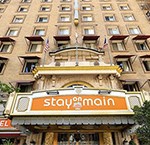The notorious Cecil Hotel — backdrop of both fictional and real-life horror stories — is now the subject of a lawsuit over a real estate deal gone sour.
Tishman Realty claims that an entity tied to Simon Development and Baron Property Group owes it at least $1.3 million in damages related to its proposed investment in the Downtown Los Angeles hotel. A source familiar with the deal said the proposal came as Tishman was negotiating its role in the redevelopment of the hotel as voucher-based housing, coming in as a preferred equity investor.
According to a summons filed in New York Supreme Court, the Manhattan-based companies signed a commitment letter in January, but executives Jonathan Simon and Matthew Baron terminated it on April 6. Tishman alleges that it should be paid for the costs associated with its proposed investment, along with interest accruing for each day it is not reimbursed.
The summons also alleges that Simon and Baron failed to “keep work product” prepared by Tishman “confidential … improperly using such confidential materials in connection with other potential counterparties and transactions.”
Details on the value of the proposed investment were not immediately available, as Tishman has not yet filed a full complaint. Jay Hellman, who represents Simon and Baron, said his clients deny the allegations and plan to “assert significant counterclaims” should the lawsuit move forward.
The two executives approached their end of the deal on the Cecil Hotel jointly as Simon Baron Development. The entity entered into a 99-year ground lease at the hotel in 2015 and soon announced plans to convert the property into a boutique inn with an additional 300-plus micro apartments. At the time, the gut renovation was billed as a turning point for the hotel, located in the Historic Core district of Downtown Los Angeles, a section that’s been at the center of long-running litigation over homeless encampments and attempts to clear them from public sidewalks.
The plan for the hotel didn’t pan out, stumbling after one of its expected participants, co-living start-up Ollie, was acquired by Starcity.
In December 2020, Simon Baron secured a $30 million loan from a joint venture of Slate Property Group and Atalaya Capital Management to help with the hotel’s conversion, though the developer indicated at the time that it was still figuring out how the property would be used.
In December 2021, the hotel reopened as voucher-based housing, in partnership with the Skid Row Housing Trust, a non-profit that operates a portfolio of single-room occupancy hotels, with most in the Skid Row district a few blocks east of the Cecil Hotel. According to City News Service, the project includes 600 low-income, single-room occupancy units and efficiency studios between the sizes of 160 and 176 square feet.
Read more



According to Esquire, the Cecil Hotel was once known as “America’s Death Hotel,” following a number of violent incidents and deaths there. At least two serial killers — Richard Ramirez and Jack Unterweger— stayed at the hotel, during their respective killing sprees. In 2013, 21-year-old Elisa Lam was found dead in the hotel’s rooftop water tank. The student’s death has served as the subject of a Netflix documentary, “The Vanishing at the Cecil Hotel” and inspired the fifth season of the fictional FX series, “American Horror Story.”
